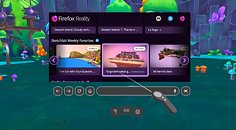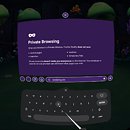- Joined
- Jul 1, 2014
- Messages
- 3,723 (0.94/day)
The name of the product may sound ironic given the intended application, but the Mozilla Firefox Reality web browser is the first of its kind to be built dedicated to virtual reality (and also augmented-, and mixed-reality for that matter) portals. Mozilla had originally announced earlier this year this was in the making, and today we see availability at the usual VR suspects- Viveport, Oculus, and Daydream app stores. The Mixed Reality Team at Mozilla felt that VR took advantage of the so-called 3D immersive web, and that using existing 2D-centric browsers meant not being able to, in their words, "enjoy it".
This meant that Mozilla built Firefox Reality with a new approach to navigation, user input, searches and more. Features built into the browser include searching with one's voice, for example, taking advantage of microphones either integrated in headsets or as part of audio peripherals used in conjunction. Mozilla says they spent thousands of hours testing and collecting feedback from users to get to the release version of the browser, and this comes also in the form of a new home screen that adds interactive, immersive experiences right from the get go as seen below. More to follow past the break.


Firefox Reality is based off Mozilla's new Quantum engine for mobile browsing, which helps provide smooth, consistent performance that is critical for a non-nauseating VR experience. Oh, and there is a private browser option built-in which Mozilla says is continuation of their efforts to fight for user privacy online. Version 1.0 as it is out today does have a few missing features we take for granted with the more popular so-called 2D browsers- bookmarks, for example, are not present here. Ditto with user accounts, which goes a long way towards personalizing the browsing experience for the end user. Mozilla did say that version 1.1 is round the corner, and that these missing features will be added in shortly along with others such as support for 360° videos. They have also provided an open invite to developers, as well as new users, to share feedback by emailing them here.
Firefox Reality can be downloaded here for Oculus (including Oculus Go), here for Daydream devices (including all-in-ones), and by searching for it on the Viveport store. This joins other browsers based-off existing ones and customized for VR, including Google Chrome for Daydream View, and provides more of a reason for VR-centric peripherals to continue being developed- something that Logitech and SteelSeries will no doubt appreciate.
View at TechPowerUp Main Site
This meant that Mozilla built Firefox Reality with a new approach to navigation, user input, searches and more. Features built into the browser include searching with one's voice, for example, taking advantage of microphones either integrated in headsets or as part of audio peripherals used in conjunction. Mozilla says they spent thousands of hours testing and collecting feedback from users to get to the release version of the browser, and this comes also in the form of a new home screen that adds interactive, immersive experiences right from the get go as seen below. More to follow past the break.


Firefox Reality is based off Mozilla's new Quantum engine for mobile browsing, which helps provide smooth, consistent performance that is critical for a non-nauseating VR experience. Oh, and there is a private browser option built-in which Mozilla says is continuation of their efforts to fight for user privacy online. Version 1.0 as it is out today does have a few missing features we take for granted with the more popular so-called 2D browsers- bookmarks, for example, are not present here. Ditto with user accounts, which goes a long way towards personalizing the browsing experience for the end user. Mozilla did say that version 1.1 is round the corner, and that these missing features will be added in shortly along with others such as support for 360° videos. They have also provided an open invite to developers, as well as new users, to share feedback by emailing them here.
Firefox Reality can be downloaded here for Oculus (including Oculus Go), here for Daydream devices (including all-in-ones), and by searching for it on the Viveport store. This joins other browsers based-off existing ones and customized for VR, including Google Chrome for Daydream View, and provides more of a reason for VR-centric peripherals to continue being developed- something that Logitech and SteelSeries will no doubt appreciate.
View at TechPowerUp Main Site




